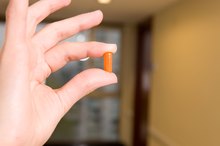Aloe Vera Juice & Constipation in Children
A constipated child is a cranky child, and chronic constipation can lead to painful anal fissures and impacted stool. Parents want to give their child the most gentle-sounding remedy available, and some people assume that aloe vera juice is a safe, all-natural laxative. While aloe vera juice is natural, it is not necessarily safe, especially for children. Your best bet is to ask for your doctor's treatment recommendation, which will depend upon the cause of the constipation.
About Constipation in Children
Constipation can occur in children as a result of potty training stress, medication or a low-fiber diet. You may notice a decrease in appetite, irritability and stool in the child's underwear, and the child may become nauseous and have a painful abdomen. Your doctor will recommend the appropriate remedy, either over-the-counter or prescription, but you should never give your child an enema or laxative unless your doctor specifically recommends it. While the laxative effects of aloe vera are scientifically proven, it's safety is still in question.
- Constipation can occur in children as a result of potty training stress, medication or a low-fiber diet.
- Your doctor will recommend the appropriate remedy, either over-the-counter or prescription, but you should never give your child an enema or laxative unless your doctor specifically recommends it.
About Aloe Vera Juice
How Much Prune Juice Should Constipated Toddlers Drink?
Learn More
Aloe juice is not the same thing as aloe gel, the familiar sunburn soother. While aloe gel is made from the gooey inside of the fleshy leaves, aloe juice is made from the whole leaf and contains aloe latex, a thin layer between the outer skin and the inner flesh. Concerns over the long-term safety of aloe latex prompted the U.S. Food and Drug Administration to ban the use of aloe latex in over-the-counter laxative preparations in 2002. Although aloe latex is no longer an acceptable ingredient on its own, it is still present in juice made from the whole leaf.
- Aloe juice is not the same thing as aloe gel, the familiar sunburn soother.
- While aloe gel is made from the gooey inside of the fleshy leaves, aloe juice is made from the whole leaf and contains aloe latex, a thin layer between the outer skin and the inner flesh.
Safety
Aloe vera juice is not recommended for constipation relief for anyone, but especially not for children. MedlinePlus.com advises against using it in children, especially those under 12 years old. Aloe vera juice can partially paralyze the intestinal wall, making bowel movements more difficult, and may cause cramping and diarrhea in children. Fortunately, other treatment options are available that are safer for children.
- Aloe vera juice is not recommended for constipation relief for anyone, but especially not for children.
Alternatives
A Bath With Baking Soda for Constipation in Children
Learn More
Your doctor will tell you what type of remedy to use. In some cases, a simple fiber supplement is all it takes, but a stool softener or laxative may be more effective in other cases. The University of Maryland Medical Center recommends senna and cascara stool softeners as an aloe alternative; they are related to aloe botanically, but they aren't associated with the negative health effects. Encouraging your child to eat more fruit and vegetables and drink more water can help prevent future occurrences.
- Your doctor will tell you what type of remedy to use.
- The University of Maryland Medical Center recommends senna and cascara stool softeners as an aloe alternative; they are related to aloe botanically, but they aren't associated with the negative health effects.
Related Articles
References
- Dat, A.; Poon, F.; Pham, K. et al. Aloe vera for treating acute and chronic wounds. Cochrane Database Syst Rev. 2012 Feb 15;(2):CD008762. DOI: 10.1002/14651858.CD008762.pub2.
- Haddad, P.; Amouzgar-Hashemi, F.; Samsami, S. et al. Aloe Vera for Prevention of Radiation-Induced Dermatitis: a Self-Controlled Clinical Trial. Curr Oncol. 2013 Aug;20(4):e345-8. DOI: 10.3747/co.20.1356.
- Heggie, S.; Bryant, G.; Tripcony, L. et al. A Phase III Study on the Efficacy of Topical Aloe Vera Gel on Irradiated Breast Tissue. Cancer Nurs. 2002;25(6):442-51.
- Langmead, L.; Feakins, R.; Goldthorpe, S.et al. Randomized, Double-blind, Placebo-controlled Trial of Oral Aloe Vera Gel for Active Ulcerative Colitis. Aliment Pharmacol Ther. 2004;19(7):739-47. DOI: 10.1111/j.1365-2036.2004.01902.x.
- Paulsen, E.; Korsholm, L.; and Brandrup, F. Double-blind, Placebo-Controlled Study of a Commercial Aloe Vera Gel in the Treatment of Slight to Moderate Psoriasis Vulgaris. J Eur Acad Dermatol Venereol. 2005:19(3):326-31. DOI: 10.1111/j.1468-3083.2004.01186.x.
- Suksomboon, N.; Poolsup, N.; Punthanitisarn, S. et al. Effect of Aloe vera on glycaemic control in prediabetes and type 2 diabetes: a systematic review and meta‐analysis. J Clin Pharm Ther. 2016;41(2):180-8. DOI: 10.1111/jcpt.12382
- Zhang, Y.; Liu, W.; Liu, D. et al. Efficacy of Aloe Vera Supplementation on Prediabetes and Early Non-Treated Diabetic Patients: A Systematic Review and Meta-Analysis of Randomized Controlled Trials. Nutrients. 2016 Jul; 8(7): 388. DOI: 10.3390/nu8070388.
Writer Bio
Angela Brady has been writing since 1997. Currently transitioning to a research career in oncolytic virology, she has won awards for her work related to genomics, proteomics, and biotechnology. She is also an authority on sustainable design, having studied, practiced and written extensively on the subject.









